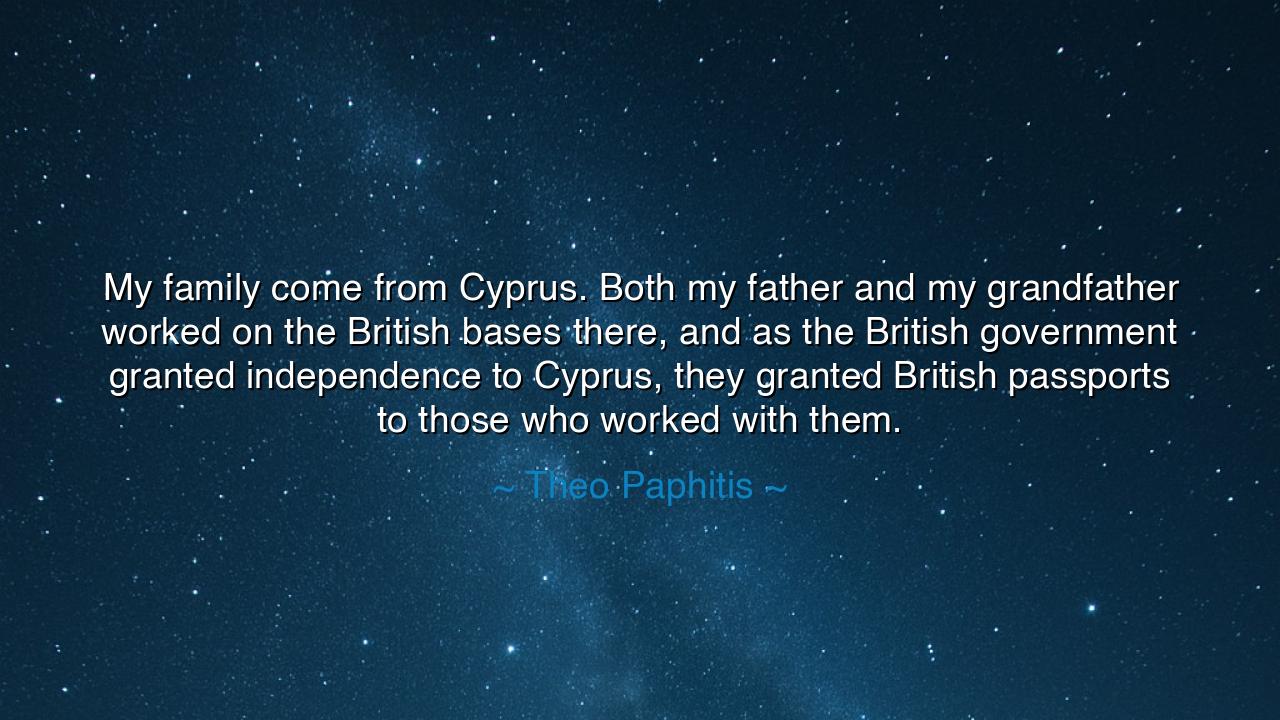
My family come from Cyprus. Both my father and my grandfather
My family come from Cyprus. Both my father and my grandfather worked on the British bases there, and as the British government granted independence to Cyprus, they granted British passports to those who worked with them.






When Theo Paphitis said, “My family come from Cyprus. Both my father and my grandfather worked on the British bases there, and as the British government granted independence to Cyprus, they granted British passports to those who worked with them,” he spoke not merely of his lineage, but of the interwoven destinies of nations and individuals, of how history leaves its fingerprints upon families for generations. His words are a quiet reflection on the legacy of empire, migration, and opportunity — the way great political tides carry ordinary people across borders, shaping who they become. Beneath the surface of his statement lies a timeless truth: that independence and identity are born not only in nations, but in families — in the courage of those who adapt, rebuild, and begin anew.
The origin of this quote lies in the life story of Theo Paphitis himself — a man known for his success as an entrepreneur in Britain, but whose roots reach back to the sun-baked island of Cyprus. In the 1960s, Cyprus gained independence from British colonial rule, ending nearly eighty years of administration under the British crown. Yet, for those who had labored alongside the British — men like Paphitis’s father and grandfather — independence brought both liberation and uncertainty. The granting of British passports to Cypriots who had worked on the bases was not merely an act of bureaucracy; it was a bridge between two worlds. It opened a door that would allow families like the Paphitises to seek new lives in Britain, carrying with them both the pride of their Cypriot heritage and the privileges of British citizenship.
In Paphitis’s words, one can sense the weight of history, but also the quiet gratitude of inheritance. His family’s story is that of countless others across the twentieth century — people caught in the vast machinery of empire, yet finding within it the seeds of new beginnings. For them, independence was not an abstract political event; it was a personal reckoning. It meant redefining who they were — no longer subjects of empire, yet forever marked by its reach. In that transition lies a deeper human truth: that freedom is rarely pure, and identity is rarely simple. We are all, in some way, the children of both history and choice.
The ancient philosophers would have recognized this wisdom. For they, too, believed that a person’s destiny is shaped by both the circumstances of birth and the decisions of the soul. The Paphitis family could not choose the end of empire, but they could choose how to meet it — with resilience, courage, and adaptability. Like the sailors of old who navigated shifting winds and unpredictable seas, they learned to harness change instead of resisting it. In doing so, they gave their descendants — including Theo himself — the tools to thrive in a new land. Thus, his family’s story becomes a parable of transformation: the empire fades, but its echoes become the stepping stones for the next generation.
There is also, within this quote, a meditation on the complex legacy of independence. When nations gain freedom, they do not erase the past; they carry its weight forward. The British bases in Cyprus remained even after independence — symbols of lingering power, yet also sources of connection. The passports granted to workers like Paphitis’s grandfather reveal that independence and interdependence often coexist. No nation, and no person, stands entirely alone. The wise understand this — that freedom is not separation, but the ability to move between worlds with dignity and purpose.
Consider, too, the story of India’s independence in 1947. When the British departed, they left behind deep scars — but also bridges of language, law, and opportunity. Many Indians who had worked for the British found themselves in a similar position to Paphitis’s forebears: torn between the pride of a free homeland and the pragmatism of belonging to a global empire. Some stayed; others journeyed across the seas to build new lives. Their children, like Paphitis, would inherit not one identity but many — proof that the past, when embraced with wisdom, can become a source of strength rather than division.
So, my children of the modern age, learn from Theo Paphitis’s reflection. Honor your roots, but do not let them bind you. Understand that history will shape you, but it does not have to define you. The independence of nations may come through revolutions and treaties, but the independence of spirit is forged through adaptability, gratitude, and vision. Whether your ancestors were conquerors or laborers, rulers or rebels, carry their stories not as burdens, but as beacons. For in knowing where you come from — and in daring to build beyond it — you embody the truest form of freedom: the kind that belongs not to nations, but to the soul that learns, endures, and grows through time.






AAdministratorAdministrator
Welcome, honored guests. Please leave a comment, we will respond soon